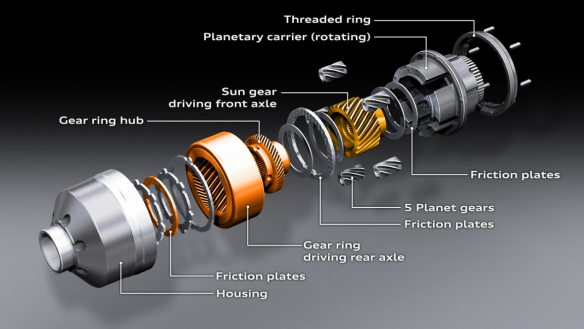Self-locking center differential
In 2005, Audi set off the next stage in the evolution of its classic quattro drive system in the second-generation RS 4. The new self-locking center differential, which is used in many models today, remained true to the principle of mechanical function, yet represented significant progress over the Torsen differential.
Under normal driving conditions, power is distributed 40:60 between the front and rear axles. This asymmetric and dynamic distribution of torque results in sporty handling with a rear-end bias. The center differential can divert up to 60 percent of the power to the front and up to 80 percent to the rear, if necessary. If a wheel on one axle should happen to spin, the electronic differential lock EDL controls it by applying the brakes.
The self-locking center differential is configured as a planetary gear. An internal gear encloses a sun gear; rotating between these two elements are roller-shaped planet gears connected to a rotating housing. They distribute the torque asymmetrically – the somewhat larger fraction flows to the rear via the internal gear, which has a larger diameter, and the output shaft connected to it. The smaller fraction is transferred to the smaller sun gear, from where it is sent to the front axle.
If traction at one of the axles declines, the helical form of the gears and their oblique splines produce axial forces in the differential. These forces act on the friction disks to provide the desired locking torque and to divert the power to the wheels with the better friction values.
The full-size Q7 SUV (Combined fuel consumption in l/100 km: 10.7 – 7.2; Combined CO2-emissions in g/km: 249 - 189) uses a special form of the quattro drivetrain – in this case, the self-locking center differential is integrated into a separate transfer case. The sun gear uses a chain to drive an auxiliary shaft that runs past the gearbox to the front axle. The chain is used to transport the oil, eliminating the need for the oil pump normally used. The entire drivetrain of the Q7 has shed considerable weight in the latest evolutionary stage. Regardless, the transfer case is very robust. It also allows a high ground clearance, an important trait for off-road use.
Status: 2011
